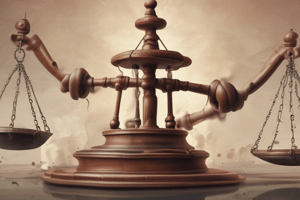Podcast
Questions and Answers
What is the essential element of negligence that involves a failure to meet a required standard?
What is the essential element of negligence that involves a failure to meet a required standard?
- Causation
- Duty of Care
- Breach of Duty (correct)
- Damages
What is the primary factor in determining the duty of care?
What is the primary factor in determining the duty of care?
- The standard of care required in the situation
- Reasonable foreseeability of harm to the plaintiff (correct)
- The level of damages suffered by the plaintiff
- Proximity between the defendant and the plaintiff
What is the level of care that a reasonable person would take in the same circumstances?
What is the level of care that a reasonable person would take in the same circumstances?
- Duty of Care
- Standard of Care (correct)
- Breach of Duty
- Causation
What type of negligence involves a failure to perform a required action?
What type of negligence involves a failure to perform a required action?
What is required to establish causation in a negligence claim?
What is required to establish causation in a negligence claim?
What is the final element required to prove negligence?
What is the final element required to prove negligence?
Flashcards are hidden until you start studying
Study Notes
Definition of Negligence
- Negligence is a tort that involves a breach of a duty of care, resulting in damage or injury to another person.
Elements of Negligence
- Duty of Care: The defendant must have a legal duty to take care of the plaintiff.
- Breach of Duty: The defendant must have failed to meet the required standard of care.
- Causation: The breach of duty must have caused the plaintiff's harm.
- Damages: The plaintiff must have suffered actual harm or damage.
Duty of Care
- The duty of care arises when there is a reasonable foreseeability of harm to the plaintiff.
- The test for determining the duty of care is:
- Was the harm to the plaintiff reasonably foreseeable?
- Was there a relationship of proximity between the defendant and the plaintiff?
- Would a reasonable person have taken steps to prevent the harm?
Standard of Care
- The standard of care is the level of care that a reasonable person would take in the same circumstances.
- The standard of care may vary depending on the circumstances, such as:
- Professional negligence (e.g. doctor, lawyer)
- Skilled activities (e.g. driving, sports)
Breach of Duty
- A breach of duty occurs when the defendant fails to meet the standard of care.
- The breach may be:
- An act (e.g. doing something that causes harm)
- An omission (e.g. failing to do something that could have prevented harm)
Causation
- Causation requires that the breach of duty be the cause of the plaintiff's harm.
- The "but for" test is used to determine causation:
- Would the harm have occurred but for the breach of duty?
Damages
- Damages are the losses or harm suffered by the plaintiff.
- Damages may be:
- Physical harm (e.g. personal injury)
- Emotional harm (e.g. psychological distress)
- Economic harm (e.g. financial loss)
Definition of Neglegence
- Negligence is a tort that involves a breach of a duty of care, resulting in damage or injury to another person.
Elements of Negligence
- 4 essential elements: duty of care, breach of duty, causation, and damages.
Duty of Care
- Arises when there is a reasonable foreseeability of harm to the plaintiff.
- Tested by:
- Was the harm to the plaintiff reasonably foreseeable?
- Was there a relationship of proximity between the defendant and the plaintiff?
- Would a reasonable person have taken steps to prevent the harm?
Standard of Care
- Level of care that a reasonable person would take in the same circumstances.
- Varies depending on the circumstances (e.g. professional negligence, skilled activities).
- Applied to determine if the defendant's actions met the required standard.
Breach of Duty
- Occurs when the defendant fails to meet the standard of care.
- Can be an act (e.g. doing something that causes harm) or an omission (e.g. failing to do something that could have prevented harm).
Causation
- Requires that the breach of duty be the cause of the plaintiff's harm.
- Tested by the "but for" test:
- Would the harm have occurred but for the breach of duty?
Damages
- Losses or harm suffered by the plaintiff.
- Can be physical (e.g. personal injury), emotional (e.g. psychological distress), or economic (e.g. financial loss).
Studying That Suits You
Use AI to generate personalized quizzes and flashcards to suit your learning preferences.




